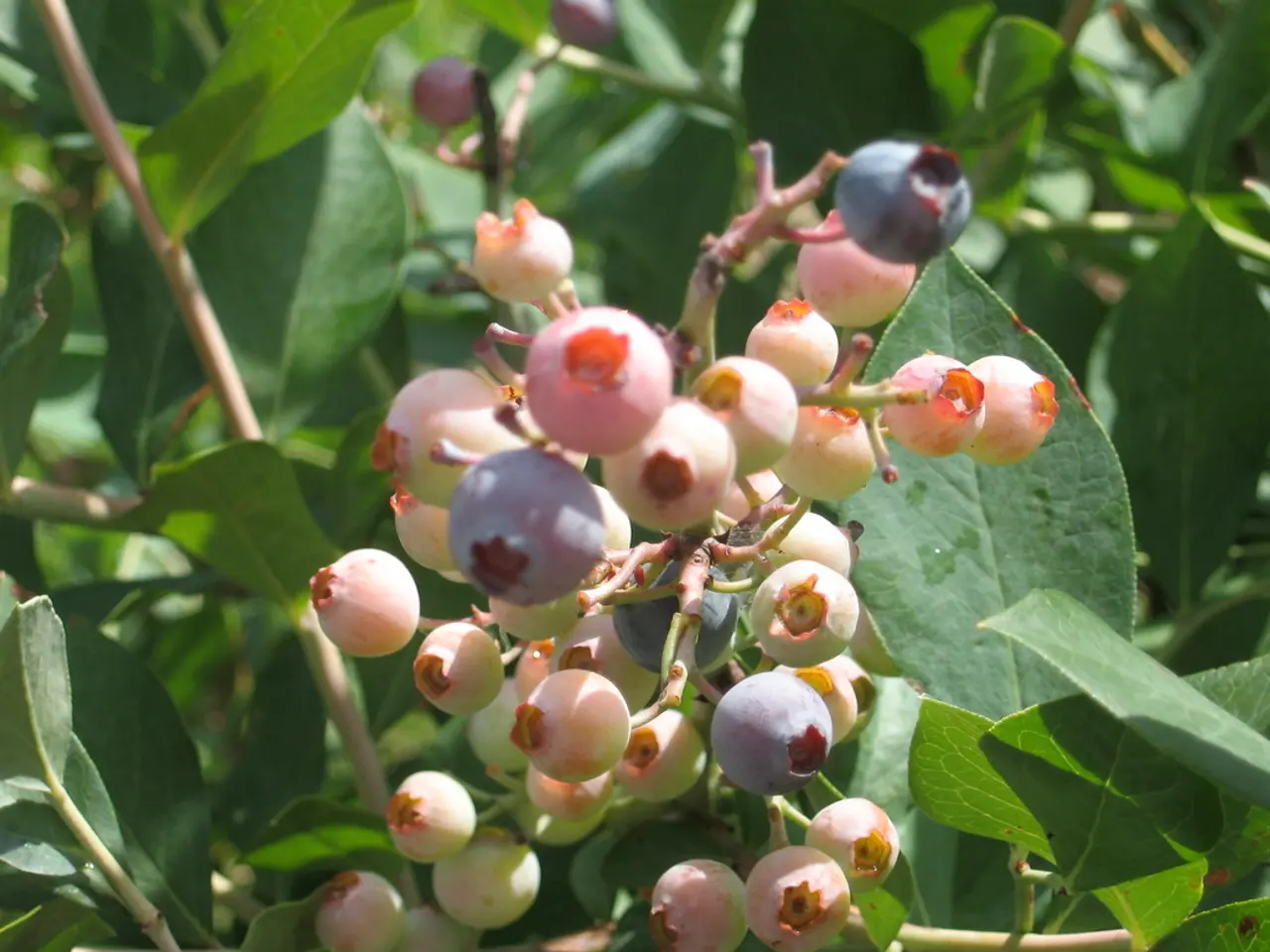Unknown Berries Providing Strong Defense Against Free Radicals
Lesser-known berries such as chokeberry, thimbleberry, dewberry, barberry, marlberry, lingonberry, salmonberry, and bayberry have recently gained attention for their potential health benefits. These berries, often overlooked compared to more common varieties like blueberries or blackberries, are antioxidant-rich fruits that may support brain health, cardiovascular function, metabolic balance, and overall healthy aging.
Each of these berries contains unique profiles of antioxidants and other nutrients. For instance, chokeberry, also known as Aronia, is celebrated for its very high antioxidant content, particularly anthocyanins. These compounds are known to neutralise harmful free radicals that contribute to cell damage and aging, and support neuroprotective and anti-inflammatory effects that may reduce risks of chronic diseases like heart disease, diabetes, and neurodegenerative conditions such as Alzheimer's and Parkinson's disease.
Lingonberry, a cranberry-looking fruit, is the primary dietary source of anthocyanins and other antioxidants for people living in frozen Scandinavia. Rich in antioxidants similar to blueberries, lingonberries may have anti-inflammatory and antimicrobial properties, contributing to healthy aging.
Barberry, another lesser-known berry, contains berberine, a compound with antioxidant and anti-inflammatory effects. This compound may help regulate blood sugar and support heart health.
Thimbleberry, dewberry, marlberry, salmonberry, and bayberry, while less researched, are presumed to have comparable antioxidant properties to other berries containing anthocyanins and polyphenols. Their benefits are often inferred based on their antioxidant content and similarities to well-studied berries.
Many berries support cardiovascular health by lowering LDL cholesterol and improving insulin sensitivity, important factors to reduce the risk of age-associated metabolic syndromes. For example, barberry is traditionally noted for benefits to heart health and may have anti-inflammatory and antioxidant effects.
The fibre content of these berries is also noteworthy, supporting digestive health and contributing to overall metabolic well-being, another factor relevant to healthy aging.
Although scientific research specifically on some of these berries is more limited compared to common varieties, their benefits are often inferred based on their antioxidant content and similarities to well-studied berries. It's worth noting that some of these less common berries can be purchased freeze-dried or as berry powders online, and studies indicate that they still pack a powerful nutritional punch.
Incorporating these lesser-known berries into a balanced diet may offer a natural and delicious way to combat free radical damage and inflammation, both key contributors to aging and age-related diseases. For those interested in growing their own berries, thimbleberry and dewberry can be cultivated in gardens for personal consumption or as food for foraging wildlife.
In summary, these lesser-known berries are antioxidant-rich fruits that combat free radical damage and inflammation, both key contributors to aging and age-related diseases. Incorporating them into a balanced diet may support brain health, cardiovascular function, metabolic balance, and overall healthy aging, similar to better-known berries like blueberries or blackberries.
- The science behind the health benefits of lesser-known berries like chokeberry is gaining attention, due to their rich antioxidant content.
- Anthocyanins, found in high concentrations in chokeberries, have been recognized for their neuroprotective and anti-inflammatory effects.
- Lingonberries, with their cranberry-like appearance, are a primary source of antioxidants for people in Scandinavia and may offer anti-inflammatory and antimicrobial properties.
- Barberry, with its berberine content, may aid in regulating blood sugar and supporting heart health.
- Thimbleberry, dewberry, marlberry, salmonberry, and bayberry, while less researched, are believed to have comparable antioxidant properties.
- These berries are found to lower LDL cholesterol and improve insulin sensitivity, which can reduce the risk of age-related metabolic syndromes.
- The fibre content in these berries supports digestive health and overall metabolic well-being, another factor in healthy aging.
- While research on some of these berries is limited, their benefits are often inferred based on their antioxidant content and similarities to well-studied berries.
- Some of these less common berries are available in freeze-dried or powdered forms online, retaining their nutritional benefits.
- Incorporating these lesser-known berries into a balanced diet may provide a natural and tasty way to combat free radical damage and inflammation.
- For those interested in growing their own berries, thimbleberry and dewberry can be cultivated in gardens.
- Lesser-known berries like chokeberry, lingonberry, barberry, and their counterparts, combat free radical damage and inflammation, key contributors to aging and age-related diseases.
- Incorporating these berries into a diet may support brain health, cardiovascular function, metabolic balance, and overall healthy aging, much like their more popular counterparts like blueberries or blackberries.
- Nutrition in these berries has the potential to contribute significantly to one's health and wellness.
- The benefit of these lesser-known berries extends to various medical conditions, including chronic diseases like diabetes and neurodegenerative disorders such as Alzheimer's and Parkinson's disease.
- The health and wellness industry is attracted to the potent antioxidant properties of these berries, which may support immune function and overall health.
- Studies suggest that incorporating these berries into a fitness and exercise routine may accelerate recovery and promote overall well-being.
- The antioxidant benefits of these berries may also support sexual health, especially in men.
- Maintaining family health becomes simpler with the addition of these antioxidant-rich berries, thanks to their potential to reduce the risk of autoimmune disorders.
- The impact of climate change and its effect on agricultural practices may be mitigated by focusing on the cultivation of these resilient berries.
- The manufacturing industry can explore the potential of these lesser-known berries in food, beverage, and supplement production.
- Men's health can benefit significantly from the inclusion of these berries in diet, due to their effects on cardiovascular health and potential support for prostate health.
- Skin care routines can be improved by incorporating these berries, known for their antioxidant and anti-inflammatory properties, to prevent and treat skin conditions.
- In the realm of therapies and treatments, the potential applications of these berries are vast, from cancer treatments to managing neurological disorders like Alzheimer's and Parkinson's disease.




